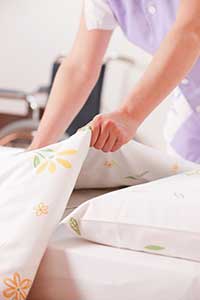Search
To Turn, Or Not To Turn. Can Nursing Home Patients Effectively Choose To Develop Bed Sores?
 There was an interesting thread on The National Review Online written by Wesley Smith, “Should Patients Be Allowed To Die From Bed Sore?” which discusses the ethical considerations involved when a patient effectively refuses medical care. Taking the concept of ‘refusing’ medical care one step further, Smith raises a point which I found to be particularly interesting as a nursing home abuse attorney, can patients in hospitals and nursing homes effectively refused to be ‘turned’ (‘turning’ allows the bodies natural circulatory process to take place and reduce the chance of a patient developing a wound) in order to prevent the development of bed sores or pressure sores?
There was an interesting thread on The National Review Online written by Wesley Smith, “Should Patients Be Allowed To Die From Bed Sore?” which discusses the ethical considerations involved when a patient effectively refuses medical care. Taking the concept of ‘refusing’ medical care one step further, Smith raises a point which I found to be particularly interesting as a nursing home abuse attorney, can patients in hospitals and nursing homes effectively refused to be ‘turned’ (‘turning’ allows the bodies natural circulatory process to take place and reduce the chance of a patient developing a wound) in order to prevent the development of bed sores or pressure sores?
Referencing a Medscape article written by bio-ethicist Art Caplan, “You MUST Let My bedsores Kill Me. You MUST!”, Caplan takes the position that all people should be entitled to make their own decisions when it comes to their medical care and personal needs. While discussing a situation in which a patient developed a bed sore during an admission to a medical facility, Caplan asserts that essentially each patient should be entitled to refuse basic care such as turning so long as the patients decision doesn’t negatively impact those around him.
At the end of the day, I think this man did have the right to say “don’t touch me.” I think he had the right to say “don’t turn me.” But if his decision started to affect nursing and staff morale and began to become a problem in the delivery of care for others, then I believe that is a factor that has to be considered when deciding whether to honor what he says. The nurses cannot work if the unit becomes a smelly, untenable mess, and although this man had his rights, other people have their rights too. If I thought the care of others was being compromised by these morale issues and staff problems, I might override a patient’s wishes. I might not honor his request in the name of other people’s rights. In my opinion, there may be limits to what you can request when it affects the care that others can receive. That is a trade off that has to be weighed at all times.
While I appreciate individual choice as much as anyone, I think the entire concept of a medical facility allowing a patient to cause harm to themselves very much conflicts with the inherent responsibilities to provide care that is in the patients best needs. Unlike a patient who may be refusing invasive medical procedures based upon risk of complications or religious beliefs, a patient refusing to be ‘turned’ is likely not basing such decisions on principals– but rather stubbornness or some other underlying reason– unrelated to the care itself.
As a nursing home lawyer who works on a steady supply of bed sore lawsuits (see here), I would suggest that never once did a patient enter a facility and expect to develop a bed sore during an admission. Rather, people go to these medical facilities (nursing homes and hospitals) because they recognize that they need the expertise that these facilities can provide. Given the horrific pain and dire complications that tend to accompany most advanced pressure sores, I can’t fathom that any person would knowing want to develop these complications.
Should medical facilities adapt a policy where patients are allowed to make medical decisions which are frankly not in their best (care-related) interest, I foresee two significant problems.
1) A Slippery Slope
Is there a risk that facilities attempt to masquerade all complications as situations involving the non-compliance of patients?
Non-compliance is a frequent allegation made during the litigation process of many nursing home negligence cases (read more about these cases here)– that the patient failed to follow the instructions provided to him or her regarding their care– which may be appropriate depending on the circumstance– and if the facility or practitioner warned the patient that their behavior could lead to certain consequences. In these situations, the patients ability to make an informed decision is crucial to the concept of blame shifting.
2) Shifting Care Responsibility To Patients?
In the case of a patient who just doesn’t want to be touched or bothered to be ‘turned’, I’m willing to bet that few– if any, are fully capable of making an informed decision related to the consequences.
Moreover, the entire concept of shifting the medical decision making process to the patient– and away, from the physician further allows for the physician to allege that in all pressure sore cases it was the patients decision not to be touched– which caused his wounds to develop– thereby eliminating any responsibility on the part of the facility.
I think the concept of following a patients desires raises some important ethical issues. However, let’s not forget the underlying reason why people go to nursing homes and hospitals– to receive medical care. Let’s not encourage unnecessary shifting of responsibility when we’re dealing with patients who may not be in a position to make appreciate the fact that their seemingly innocent decisions that may ultimately cause their death.
 Nursing Home Law News
Nursing Home Law News

